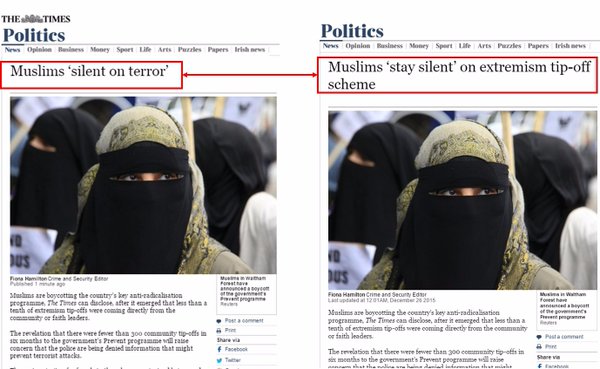An amended front-page headline from The Times (image H/T @steveplrose):
According to the text:
Muslims are boycotting the country’s key anti-radicalisation programme, The Times can disclose, after it emerged that less than a tenth of extremism tip-offs were coming directly from the community or faith leaders.
The revelation that there were fewer than 300 community tip-offs in six months to the government’s Prevent programme will raise concern that the police are being denied information that might prevent terrorist attacks.
The rest of the article is paywalled, although the guts of it appear in a derivative PA article:
…The Times says that data released by the National Police Chiefs Council has revealed that of the 3,288 referrals to Prevent in the first half of the year, just 280 – or 8.6% – came from within the Muslim community, or from family, friends and faith leaders. Nearly 2,200 referrals were made by public bodies outside policing, such as social services and the health or education sectors.
Following the Times article, the National Police Chiefs Council issued a statement:
A legislative change was introduced in April 2015 which required public bodies to make referrals to the Prevent programme, and which led to a high number of referrals being recorded… The figures may not accurately capture the nature of the original source because in many cases members of the community will report in the first instance to the police. For example, the numbers include referrals about domestic extremism and extreme right wing radicalisation. Currently one in ten of the referrals received come direct from communities, whilst referrals from outside of police and prisons form the majority of the other referrals received
Although tactfully written, this knocks the wind out of The Times‘s front-page splash: the “2,200 referrals” are due to a change in the law, and they include data that has nothing to do with Islamic extremism; and the “280” figure is not a record of the extent to which concerned Muslims may have made “information that might prevent terrorist attacks” known to the police. The article is statistically misleading and lacks any kind of meaningful qualitative interpretation.
Note also the oddness of a headline quote that doesn’t appear to be attributed to anyone, and which is then substituted for a different headline quote. Who is saying these things, if not The Times itself? In which case, why are quote marks needed at all? One suspects that the hapless journalist has been handed a press release from someone with an interest, with the data pre-spun.
Filed under: Uncategorized | Leave a comment »



